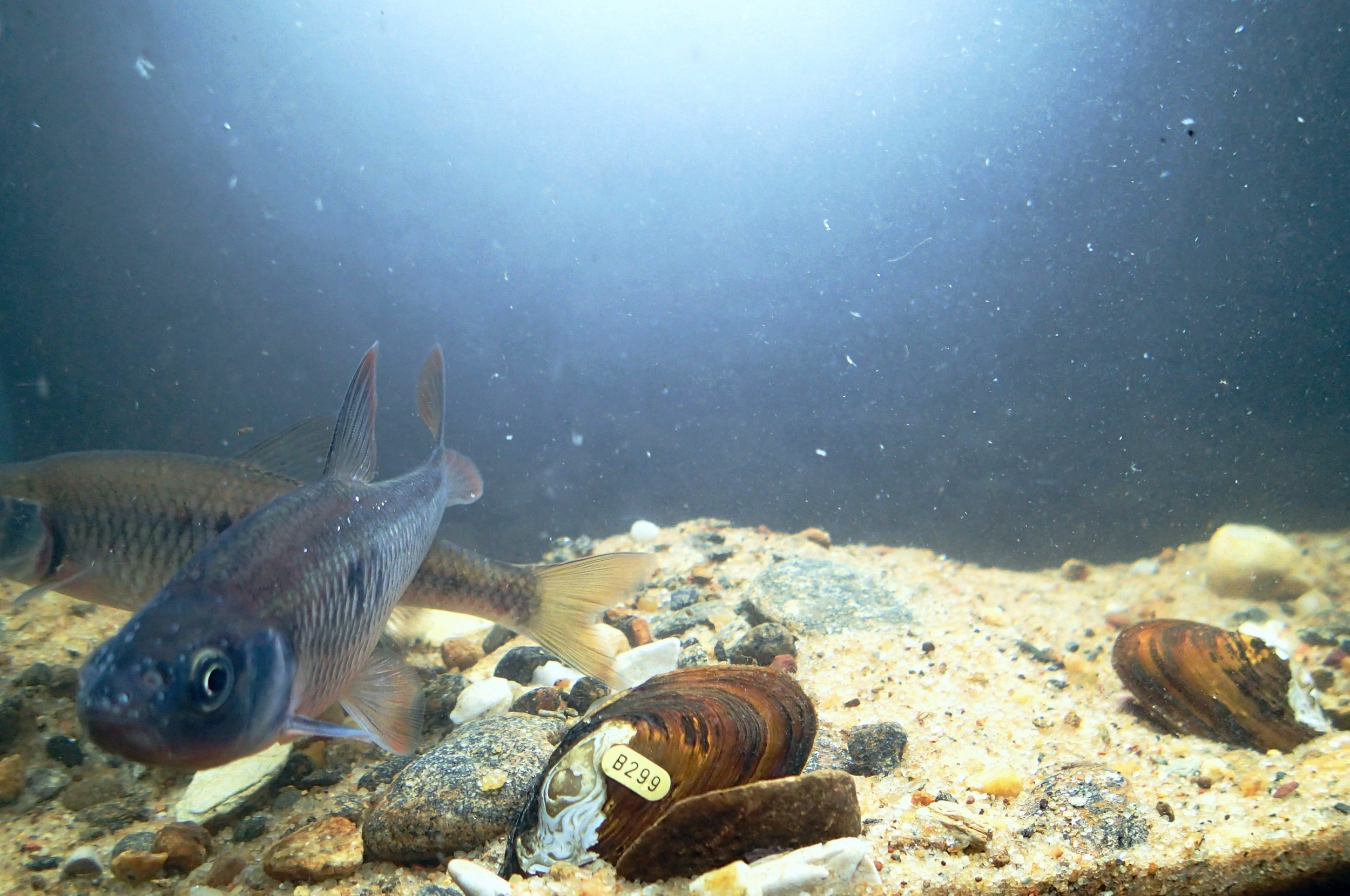
Aquatic Species Conservation
Protecting North Carolina’s At-Risk Aquatic Species
Conservation takes effort! Biologist from the NC Wildlife Resources Commission are dedicated to conserving imperiled species.
The Division of Inland Fisheries is focused on aquatic species conservation. In 2007 the Commission established, the Conservation Aquaculture Center, an aquatic nursery located in Marion, N.C. Staff work to propagate species that are deemed at-risk, endangered, threatened, and special concern, and then release them back into the wild in their native waters to help repopulate the species.
Mussels Tagged
Federally Endangered Tar River Spinymussel with its host fish, the White Shiner.
Photo Credit: Rachael Hoch
Protecting Mussels, Protecting Water Quality
Freshwater mussels are a priority for the facility because of imperilment and importance to the health of our aquatic ecosystems. They are nature’s filtration system, working hard to keep our water clean. Without mussels, our rivers and streams would become polluted with chemicals, harmful algae, bacteria, and other fine particulates that would devastate our aquatic ecosystems, rendering the water unusable by people as well as wildlife.
Since freshwater mussels filter out harmful pollutants from our waters, they serve as great indicators of water quality. Unfortunately, this ecosystem service comes at a cost. Freshwater mussels are easily are impacted by degraded habitats, leaving over 50% of our species in need of conservation.
Aquatic Nursery
Each of these units contain a variety of at-risk species from mussels and snails to sturgeon and darters! Each receiving personalized care and attention to ensure healthy populations that can be released back into the wild.
Photo Credit: Hans Lohmeyer
Life Cycle Challenges: Glochidia and Host Fish
Growing muscles isn’t easy! Nearly all species of freshwater mussels need a host fish to complete their life cycle. Each type of mussel uses a very specific type of fish. Certain species of fish are brought in solely to propagate freshwater mussels. Some adult female mussels use mimicry to lure in the right host fish for the mussel larvae, which are known as glochidia. The larvae must attach to a host fishes gills and fins within a short period of time to survive. This is a parasitic stage for larvae, however the host fish is not harmed. The host fish supports the growth of the larvae and also help disperse mussels throughout the river system, when in the wild.
Glochidia Being Released
A female mussel stringing the larvae out into the water to lure in a fish. They look like small little strings floating in the water!
Tracking and Tagging for Conservation Success
Mussels are collected and tags are affixed to the shells for continued identification in the wild or in the aquaculture systems at the hatchery. The Conservation Aquaculture Center has worked with over 25 imperiled species and stocked over 200,000 individual mussels and fish back into North Carolina waters! They do this by collecting and holding brood animals, (animals producing young, eggs, etc) from the wild and growing them out in specialized aquaculture systems that mimic natural flow, light, and temperature.
Other Species at the Center
Freshwater mussels are not the only mollusks receiving help from staff at the Conservation Aquaculture Center and Inland Fisheries Division.
Fingerling Atlantic Sturgeon
Lake sturgeon are potamodromous fish, meaning they migrate between different types of freshwater habitats to spawn. They can live a very long time with females living up to 150 years.
Photo Credit: Luke Etchison
Saving Lost Species
The Magnificent Ramshorn snail is another species that biologists are working to save through propagation and research. Concerted efforts are underway to increase the population of Magnificent Ramshorn snails. This species is thought to be extinct in the wild, individuals of the species are currently being bred in captivity with the hopes of being able to release them back onto the landscape in the near future.
Magnificint Ramshorn
An aquatic native snail that due to habitat loss is currently no longer found in the wild in NC.
Photo Credit: Rachael Hoch
Research and Propagation for Future Generations
Biologists have worked tirelessly to assist as many species of greatest conservation need as possible, including fish and aquatic snails. The facility has conducted research and reared over one million individuals, understanding the value that each animal has in the aquatic ecosystem. These efforts increase our understanding of these cryptic and rare species and their chances of survival now and in the future.
Fertilized eggs from at-risk, endangered, threatened, and special concern fish species are brought back to the hatchery to hatch and grow to a releasable size before being put back into the wild.





